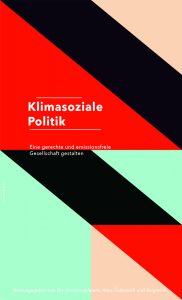Climate-social politics: How to shape a just and emission-free society? – Discussion
 Climate-social politics: How to shape a just and emission-free society?
Climate-social politics: How to shape a just and emission-free society?
27.1.2022, 1.15 – 2.45 pm, online
https://archaea.univie.ac.at/climate/
When social dimensions are brought into the climate crisis discourse, the achievement of both,
social and ecological advantages, is often framed as conflicting goals. For instance, it is argued
that effective emission reduction might lead to higher rates of unemployment or might
increase fuel poverty. Even though these arguments must be taken seriously, this panel
discussion wants to advance another perspective which has been recently introduced in the
book “Climate-social politics” (https://klimasozial.at/). The book discusses how progressive
climate-social politics can create fundamental improvements in our lives –in the ecological and
the social dimensions alike. We draw on these insights and will address the following questions
in our panel discussion: What role does wealth play for effective climate politics? How can
social inequality be addressed and how can social politics be linked to climate politics? In what
way can we shape budget and tax politics to make them climate friendly?
Panelists:
Katharina Bohnenberger is a socio-ecological economist at the Institute for Socio-Economics of
the University of Duisburg-Essen.Marlene Engelhorn is advocating for tax justice for taxmenow and also part of a group of
young people with wealth fighting for redistribution of wealth, land and power after the model
of Resource Generation.
Hendrik Theine is a postdoctoral researcher at the Department of Economics at the Vienna
University of Economics and Business.
Katarina Vrtikapa is an economist and board member of BEIGEWUM.
Moderation: Christina Plank is a postdoctoral researcher at the Institute for Development
Research at University of Natural Resources and Life Science, Vienna (BOKU).